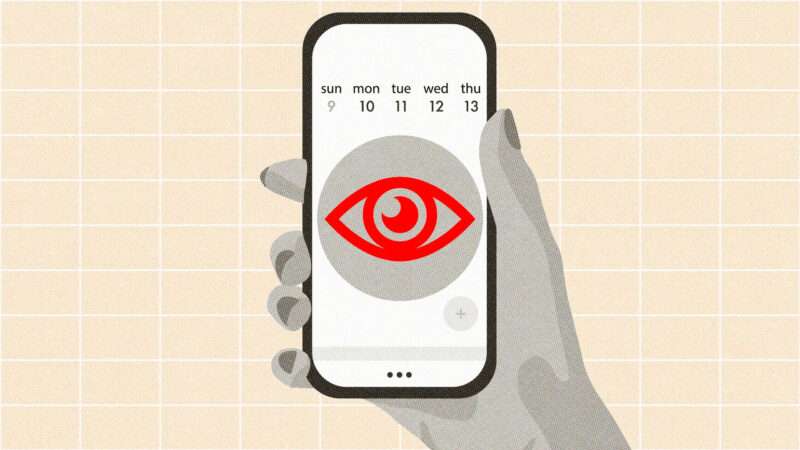
In the wake of the Dobbs v. Jackson Women's Health Organization ruling handed down by the Supreme Court on Friday, overturning nearly 50 years of abortion precedent established by Roe v. Wade (1973) and Planned Parenthood v. Casey (1992), people took to the internet to voice concerns about ways the state may crack down on women who seek abortions and suggest preemptive steps women of childbearing age ought to take to ensure they won't become prosecutorial targets.
Some women who live in safely blue states shared posts on social media indicating they'd host abortion seekers coming from red states on their couches or mail people abortion pills. People concerned about liability due to snitch laws like those established in Texas (and possibly soon mimicked by GOP copycats in Arizona) quickly reminded those women that this could theoretically allow prosecutors to go after them for aiding and abetting abortions. Instagram and Facebook began removing posts that explicitly offered illicit abortion pills. And many people spread word that period tracking apps are no longer safe for women to use if they're living in one of the 26 states that either have outlawed or will soon be outlawing abortion:
Delete your period tracking apps today.
— Jessica Khoury (@jkbibliophile) June 24, 2022
Women: delete your period tracking app
Men: download a period tracking app
— Mueller, She Wrote (@MuellerSheWrote) June 27, 2022
If you are using an online period tracker or tracking your cycles through your phone, get off it and delete your data.
Now.
— Elizabeth H.C. McLaughlin (she/her) (@ECMcLaughlin) May 3, 2022
If you are a person in the United States currently using a period tracking app, it is probably a good time to delete it from your phone now.
— Roxi Horror ???????? (@roxiqt) June 24, 2022
Though understandable, these calls to action have been poorly thought through. If you're concerned about a surveillance state newly empowered to snoop through your personal information to possibly prosecute you for procuring an illegal abortion, privacy measures must be much more thorough than merely deleting a period tracking app.
For one, the dangers posed by the data kept by period tracking apps may be overstated. These apps function based on the user proactively logging the days they menstruate and predicting fertile windows accordingly. Though they do provide information about a woman's cycle, a woman who has encountered a missed period, fearing she may be pregnant, could always log a fake period as a security mechanism to give herself cover.
But beyond that, it's really not period tracker app data that prosecutors would theoretically seek if attempting to throw people in jail or prison for illegal abortion procurement. Unencrypted messages detailing plans to seek an abortion or confirmation that one is pregnant; phone calls to abortion clinics; search history; purchasing history; location data confirming a person's physical location at a surreptitiously operating clinic—these are the pieces of a person's digital footprint that prosecutors are most likely to look for.
"My hope is that people will shoot for something other than maximum cruelty" when enforcing abortion laws, Andrew Fleischman, a criminal appeals attorney, tells Reason.
"[State prosecutors] could get a search warrant for a suspected abortion and check what's in your phone, but it won't be the period app at that point, probably text messages, calls to clinics, social media, that stuff," he confirms.
"I don't think states have the resources to like, check your app," yet, though Fleischman adds that period tracker apps could always voluntarily choose to turn over data when faced with legal scrutiny. He notes that the competence of such prosecutors is perhaps overstated, adding that "state prosecutors can't even get Facebook DMs half the time."
In the wake of such concerns that some tracker apps will cooperate with prosecutors and hand over data, some activists have suggested ostensibly more secure apps, like Stardust and Clue, which have committed to data privacy measures. But, if more-secure apps are based in the U.S., they could still theoretically be forced to hand over data through subpoenas. (Clue is based in Europe and is likely more secure than astrology-focused Stardust, which is vague about how cooperative it will be if government entities attempt to forcibly collect users' health information.)
"In addition to facilitating prosecutions of pregnant people for intentionally terminating their pregnancies, technology will also enhance the government's ability to surveille [sic], investigate, and prosecute pregnant people who did not seek to terminate but whom the state seeks control over by virtue of their pregnancy status," writes civil rights attorney Cynthia Conti-Cook in a 2020 University of Baltimore Law Review article. "For example, pregnant people's decisions—to self-medicate, to not medicate, to seek substance abuse treatment, to drink alcohol, or smoke cigarettes—are all decisions that could be criminalized and potentially surveilled digitally." This is all too true in an era where prosecutors may be more frequently looking into pregnancies, seeking evidence of chemical endangerment or suspected abortion.
"Many criminal prosecutions that would have stalled without digital evidence resulted in convictions either at trial or in plea bargaining because the digital evidence completed the picture of the accused's involvement, state of mind, or intent," adds Conti-Cook.
It's not that a pregnant woman's digital footprint can't or won't be used against her; the problem is instead that some activists have rushed to focus on less likely culprits when women concerned about surveillance should actually be taking a much more expansive approach to hiding their digital footprints from agents of the state.
The post Should Women Delete Their Period Tracker Apps in the Wake of <i>Dobbs</i>? appeared first on Reason.com.







